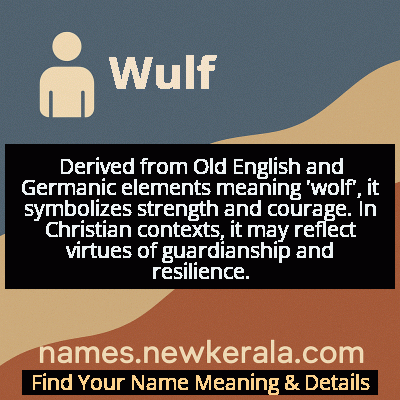Wulf Name Meaning & Details
Origin, Popularity, Numerology Analysis & Name Meaning of Wulf
Discover the origin, meaning, and cultural significance of the name WULF. Delve into its historical roots and explore the lasting impact it has had on communities and traditions.
Name
Wulf
Gender
Male
Origin
Christian
Lucky Number
8
Meaning of the Name - Wulf
Derived from Old English and Germanic elements meaning 'wolf', it symbolizes strength and courage. In Christian contexts, it may reflect virtues of guardianship and resilience.
Wulf - Complete Numerology Analysis
Your Numerology Number
Based on Pythagorean Numerology System
Ruling Planet
Saturn
Positive Nature
Ambitious, efficient, realistic, and authoritative.
Negative Traits
Materialistic, stressed, confrontational, and can be overly ambitious.
Lucky Colours
Dark blue, black.
Lucky Days
Saturday.
Lucky Stones
Blue sapphire, amethyst.
Harmony Numbers
2, 4, 6.
Best Suited Professions
Business leaders, managers, financial services, law enforcement.
What People Like About You
Leadership, determination, organizational skills.
Famous People Named Wulf
Wulfstan of York
Archbishop and Scholar
Authored 'Sermo Lupi ad Anglos' and influenced Anglo-Saxon church reforms
Wulfhere of Mercia
Anglo-Saxon King
Expanded Mercian territory and promoted Christianization in 7th century England
Wulf the Saxon
Historical Figure
Featured in historical literature as Saxon thegn serving Harold Godwinson before Norman Conquest
Name Variations & International Equivalents
Click on blue names to explore their detailed meanings. Gray names with will be available soon.
Cultural & Historical Significance
Extended Personality Analysis
People named Wulf are typically associated with a complex blend of strength, loyalty, and independence that reflects their namesake animal's characteristics. They often exhibit natural leadership qualities combined with a strong protective instinct toward their loved ones, mirroring the wolf's pack mentality. These individuals tend to be resourceful problem-solvers who approach challenges with strategic thinking and determination. Their personality often includes a balance between social engagement and solitary reflection—they value deep connections with a select few while maintaining their independence and self-sufficiency. Wulfs are frequently described as intuitive and perceptive, with an ability to read situations and people accurately. They typically demonstrate courage in adversity and resilience in difficult circumstances, drawing on inner strength that others may find remarkable. While they can appear reserved or intense to strangers, those who know them well appreciate their unwavering loyalty and deep commitment to their principles and relationships. This combination of traits makes individuals named Wulf often successful in leadership roles where both strength and emotional intelligence are required.
Modern Usage & Popularity
In contemporary naming practices, Wulf has emerged as a distinctive choice for parents seeking strong, historically grounded names with natural symbolism. While it remains outside the mainstream popularity charts in English-speaking countries, it has gained significant traction among families valuing unique names with deep cultural roots. The name's revival aligns with broader trends favoring short, powerful names and nature-inspired nomenclature. In Germany and Scandinavian countries, Wulf and its variations have maintained more consistent usage, often appearing in combination with other name elements. The name's appeal crosses multiple demographics—it attracts parents interested in Viking and Anglo-Saxon history, those seeking alternatives to more common nature names like Wolf or Bear, and families with Germanic heritage looking to honor their ancestry. Social media and popular culture have contributed to its increased visibility, with the name appearing in historical dramas and fantasy literature. Current usage patterns suggest Wulf may continue to grow in popularity as parents increasingly seek names that are both distinctive and meaningful, particularly those with strong phonetic qualities and rich historical associations.
Symbolic & Spiritual Meanings
The symbolic meanings associated with Wulf extend far beyond its literal translation as 'wolf,' encompassing layers of metaphorical significance drawn from mythology, folklore, and cultural traditions across centuries. In symbolic terms, Wulf represents the duality of nature and civilization, embodying both wild freedom and loyal community bonds. The wolf in symbolism serves as a guide between worlds—the physical and spiritual, the known and unknown—making the name appropriate for those perceived as boundary-crossers or mediators. It symbolizes fierce protection of family and territory, keen intelligence in navigation and strategy, and the resilience to survive in challenging environments. In Native American traditions, the wolf represents teacher and pathfinder, while in Celtic symbolism, it guards the underworld and possesses lunar connections. The name carries connotations of spiritual guardianship, intuition, and the ability to communicate across different realms of understanding. For Christians, while wolves were sometimes used metaphorically for threats to the flock, they also symbolized watchfulness and spiritual protection when properly guided. This rich tapestry of symbolic meanings makes Wulf a name that suggests someone who embodies strength with purpose, freedom with responsibility, and individuality within community.

